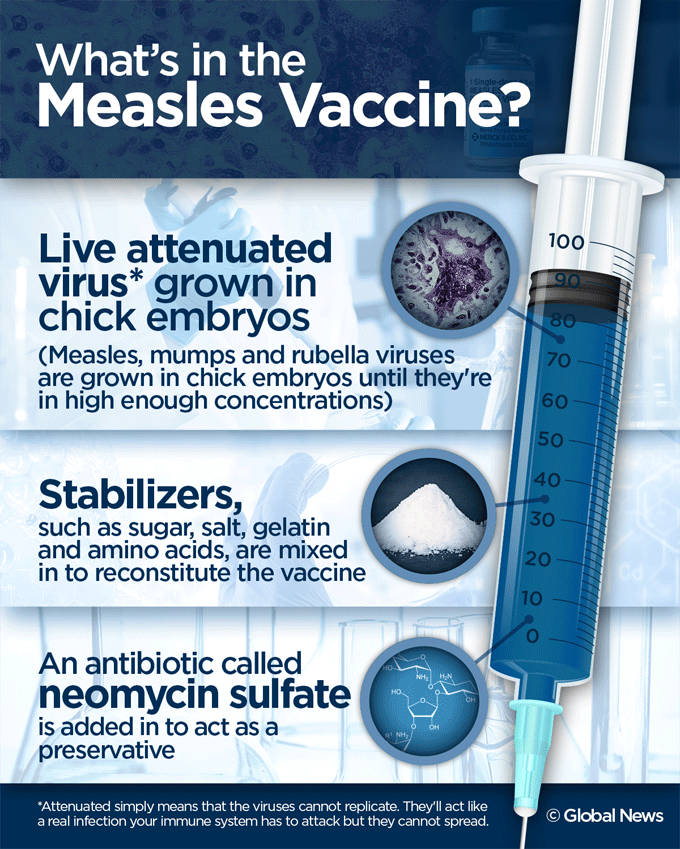As measles outbreaks make their way through North America, vaccination is on every parent’s lips. It’s a contentious issue – while health officials are urging parents to vaccinate their kids against measles, mumps and rubella, a growing community of anti-vaxxers are skeptical about the MMR vaccine.

READ MORE: Why is measles so contagious? 5 things you need to know
Google ‘anti-vaccination’ and you’ll enter the Wild West of medical debate. Some theories suggest there is a link between autism and vaccinating children. Others suggest the vaccine is toxic or contains heavy metals.
Here’s what you need to know about the measles, mumps, rubella vaccine.
How it’s made
There are four vaccines approved for use in Canada – two are made by Merck and two are made by GlaxoSmithKline. In Canada, you can’t get the measles vaccine on its own – it’s a combined measles, mumps, rubella (MMR) or measles, mumps, varicella, rubella (MMVR) vaccine. The latter includes the chicken pox.
The vaccine is made using live attenuated virus, according to Jason Tetro, a Canadian microbiologist and author of The Germ Code.
READ MORE: Anti-vaccination movement means preventable diseases making a comeback
“Attenuated simply means that it cannot replicate. It can act as if you have a real infection but it can’t spread through the rest of your body,” Tetro explained.
It’s enough virus for your immune system to kick into action to fight the infection.
The attenuated virus is grown in chick embryo cell cultures – think of unhatched fertilized eggs – until scientists have enough concentrations of the viruses.
The ingredients

Get weekly health news
After that, the viruses are massaged with other components. Sugars, salt, vitamins and amino acids are mixed in and used as stabilizers.
There are also proteins, such as albumin (a human blood component) or gelatin that help to reconstitute the vaccine.
Then there are residual antibiotics, such as neomycin sulfate, which help with preservation of the vaccine and its cultures. They also ensure that other germs won’t grow in the vaccine.
READ MORE: 6 vaccination myths debunked
There aren’t any metals, such as thimerosal or mercury, Tetro notes. Science has come a long way and these vaccines haven’t contained such ingredients for some time.
“When it comes to the composition of a vaccine, there’s nothing to worry about. We now have the power to genetically modify a virus so it’ll stimulate the immune response,” he explained.
Full ingredient lists are available online on Health Canada’s database, and they’re also readily available on package inserts.
(Earl Aspira/Global News)
Why you shouldn’t be concerned
There are worries that the vaccine can trigger illness or make you a vector for the disease. This isn’t the case, Tetro says.
For starters, the viruses in the vaccine are attenuated, which means they can’t spread and they can’t reproduce. It’s unlikely you’d shed the virus.
“People who have been vaccinated and then become exposed to the virus may still get a low-level, mild infection if they don’t have full immunity but even these people don’t shed the virus,” Tetro explained.
READ MORE: How should health officials reverse an anti-vaxxer movement?
While your body is fighting the viruses from the vaccine, you could encounter minor side effects: an aching arm from the shot, inflammation as your immune system kicks into gear, or a stomach ache, as examples.
You could be susceptible to other infections, such as a cold, as your body focuses its efforts on fighting off the vaccine’s viruses.
Why you should get the shot
It’s the most effective way to protect against measles. The first shot is typically administered by needle to infants at about 12 to 15 months of age and again at the 18-month mark or at the four- to six-year-old mark, according to the Public Health Agency of Canada.
“Measles vaccines are safe, effective and free…without immunization you’re putting yourself and loved ones at risk,” the agency said in an email to Global News.
READ MORE: Read Roald Dahl’s call for vaccination after his daughter died of measles
“The measles vaccine is one of the best we have,” according to Dr. Michael Gardam, chief of infectious disease control and prevention at the University Health Network. One shot alone comes with an efficacy rate higher than 90 per cent. A second shot boosts immunity to about 98 or 99 per cent, the experts say.
If you are vaccinated or you’ve already had the measles, you’re immune. Your body is guarded with the antibodies it needs to tame the virus.
If your child is sick or has underlying health complications, you might have to hold off on vaccination until your doctor gives you the green light. If your child is allergic to eggs, you should also consult with your doctor about vaccination, Tetro says.
carmen.chai@globalnews.ca
Follow @Carmen_Chai




Comments